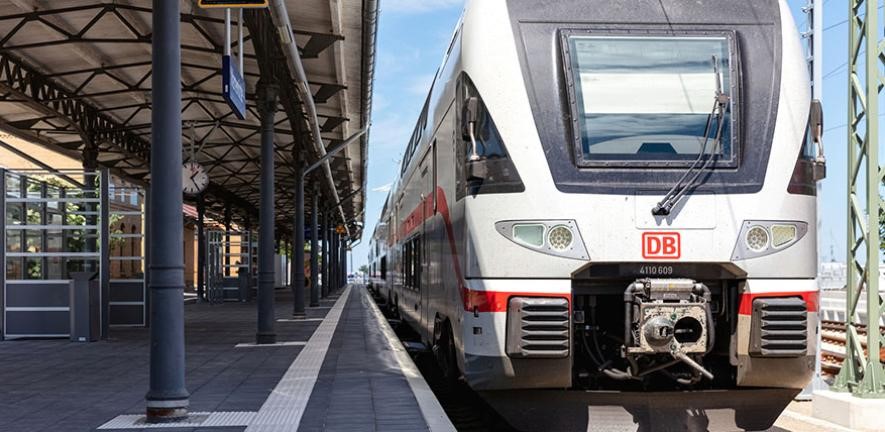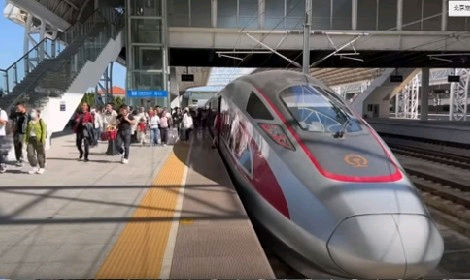英国的公共服务远远落后于东德,专家呼吁在英国建立“普遍基础设施”
正文翻译
Services across England now lag far behind East Germany, as experts call for ‘universal basic infrastructure’ in UK
英国的公共服务远远落后于东德,专家呼吁在英国建立“普遍基础设施”

(Per capita access to hospitals, mental health services, and further education facilities in German towns and cities – primarily in the former GDR – now outstrip equivalent areas in England, often several times over, according to research.)
(根据一项研究,德国城镇(主要是前民主德国)的人均医院、精神卫生服务和继续教育设施的使用率现在超过了英国的同等地区,通常高达英国的数倍。)
新闻:
A new report outlines the dismal state of England’s physical and 'social' infrastructure – from public services in health and education to the parks, cinemas and train stations that prop up communities – when compared to similar regions in what was once East Germany.
一份新的报告概述了英格兰物理和“社会”基础设施的糟糕状况——从卫生和教育的公共服务到支撑社区的公园、电影院和火车站——与曾经的东德类似地区相比。
The report’s authors call for a “universal basic infrastructure” (UBI) if the UK is to ‘level up’ its regions and lift itself out of 'flatlining' productivity rates. This UBI would see a minimum level of public and private sector services covering everything from broadband to bus routes.
该报告的作者呼吁,如果英国要“提升”其地区的水平,并使自己摆脱“停滞不前”的生产率,就需要“普遍基础设施”。这种“普遍基础设施”将使公共和私营部门的服务达到最低水平,涵盖从宽带到公交线路的所有服务。
Researchers matched eleven parts of England such as Manchester and Peterborough with German areas close in population and productivity, primarily in the former Soviet bloc – as this region was a central case study in the UK government’s flagship 2022 ‘Levelling up’ White Paper.
研究人员将英格兰的11个地区,比如曼彻斯特和彼得伯勒,与德国人口和生产力接近的地区(主要是前苏联集团)进行了对比,因为这些地区是英国政府旗舰项目2022“升级”白皮书的核心案例研究。
The report, led by the Bennett Institute for Public Policy at the University of Cambridge, found that in 2021, German towns, cities and regions have on average twice as many hospitals and pharmacies per 100,000 people as their English counterparts.
这份由剑桥大学贝内特公共政策研究所牵头的报告发现,到2021年,德国城镇和地区每10万人平均拥有的医院和药店数量是英国的两倍。
Places in Germany have over 11 times more mental health centres and practitioners, and eight times more further education providers, than equivalent parts of England, according to 2021 data.
根据2021年的数据,德国的精神卫生中心和从业人员是英格兰同等地区的11倍多,继续教育提供者是英格兰同等地区的8倍多。
In 2020, German areas also have twice as many railway stations per 100,000 people as matching English areas, although England averages almost four times more bus stops than Germany.
在2020年,德国地区每10万人的火车站数量也将是与之匹配的英国地区的两倍,尽管英国的平均公交车站数量几乎是德国的四倍。
“Access to physical and social infrastructure across England is highly variable, and shortfalls in provision affect both declining and growing areas,” said report co-author Professor Diane Coyle from Cambridge University’s Bennett Institute for Public Policy.
该报告的合著者、剑桥大学贝内特公共政策研究所的黛安·科伊尔教授称:“英格兰各地对物理和社会基础设施的使用情况变化很大,供应不足既影响到衰退地区,也影响到发展地区。”
“But even England’s wealthier areas are falling short of equivalent places in Germany, and have seen notable declines in a wide range of types of infrastructure over much of the last decade.”
“但即使是英格兰较富裕的地区也比不上德国的同类地区,在过去十年的大部分时间里,各种类型的基础设施都出现了明显的下降。”
The report shows that areas such as Cambridge and Manchester have more healthcare facilities per 100,000 people, for example – as well as more banks, museums and restaurants – compared to areas such as Bolton, Rochdale and Stevenage.
报告显示,比如,与博尔顿、罗奇代尔和斯蒂夫尼奇等地区相比,剑桥和曼彻斯特等地区每10万人中拥有更多的医疗设施,以及更多的银行、博物馆和餐馆。
In fact, Cambridge, one of the country’s wealthiest locations outside of London, has over twice as many banks and building societies, on average, and over six times as many further education providers, as Oldham, Central Bedfordshire and Rochdale.
事实上,剑桥是英国除伦敦以外最富裕的地区之一,其银行和建筑协会的平均数量是奥尔德姆、中央贝德福德郡和罗奇代尔的两倍多,继续教育机构的平均数量是奥尔德姆、中央贝德福德郡和罗奇代尔的六倍多。
However, the team also found that many elements of “social infrastructure” right across all eleven English areas have tumbled since 2014, regardless of regional wealth and average rates of income.
然而,该团队还发现,自2014年以来,无论地区财富和平均收入水平如何,英国所有11个地区的“社会基础设施”的许多要素都大幅下降。
The availability of public transport, GP practices, hospitals, mental health care, police stations, banks, cash machines, post offices, primary and further education facilities, theatres, swimming pools, museums, shopping centres, and chemists have declined across almost all English areas analysed in the report.
公共交通、全科医生诊所、医院、精神保健、警察局、银行、提款机、邮局、小学和继续教育设施、剧院、游泳池、博物馆、购物中心和药房的可用性在报告中分析的几乎所有英国地区都有所下降。
All local authorities analysed in the report reduced at least one type of health service between 2014 and 2023. For example, Blackpool, Central Bedfordshire, Stevenage and Stoke-on-Trent all decreased their number of clinics, GP practices, hospitals, and dental treatment centres.
报告分析的所有地方当局在2014年至2023年期间至少减少了一种卫生服务。比如,布莱克浦、中央贝德福德郡、斯蒂夫尼奇和特伦特河畔斯托克都减少了诊所、全科医生诊所、医院和牙科治疗中心的数量。
Even in Cambridge the number of further education facilities per 100,000 people halved between 2014 and 2023, and GP practices per capita fell by over 14%.
即使在剑桥,2014年至2023年间,每10万人中接受继续教育的机构数量也减少了一半,人均全科医生数量下降了14%以上。
The number of police stations per capita fell in all places except Bolton, and the number of public parks and gardens reduced in four out of the five areas with data. Contrary to public perception, however, the number of libraries increased across most authorities in the report.
除博尔顿外,所有地区的人均警察局数量都有所下降,有数据显示的5个地区中,有4个地区的公园和花园数量减少。然而,与公众的看法相反,报告中大多数权威机构的图书馆数量都有所增加。
“Universality across the nation is key when it comes to the infrastructure that facilitates most aspects of our daily lives,” said report co-author Stella Erker from Cambridge University’s Bennett Institute for Public Policy.
剑桥大学贝内特公共政策研究所的报告合著者斯特拉·厄克说:“在促进我们日常生活的大多数方面的基础设施方面,全国范围内的通用性是关键。”
“The community assets we should all have access to, not just schools and doctors but parks, trains, pubs and gyms, are the foundation for human wellbeing, which in turn underpins economic growth.”
“我们都应该有机会接触到的社区资产,不仅仅是学校和医生,还有公园、火车、酒吧和健身房,这些都是人类福祉的基础,反过来又支撑着经济增长。”
The researchers point out that even rapidly expanding places in England are seeing social infrastructure go in the opposite direction – an impediment to desperately needed house-building.
研究人员指出,即使在英格兰快速扩张的地区,社会基础设施也在朝着相反的方向发展——这阻碍了迫切需要的房屋建设。
For example, Bedford sits in the ‘Ox-Cam-Arc’ – an economic boom region encompassing Oxford, Cambridge and London – and is growing at three times the national rate, expanding by nearly 18% between 2011 and 2021.
比如,贝德福德位于“牛津-剑桥-弧”地区,这是一个包括牛津、剑桥和伦敦在内的经济繁荣地区,其经济增长率是全国的三倍,在2011年至2021年间增长了近18%。
Yet the town has seen local services weaken, with reductions per capita in everything from bus stops and rail facilities to GP capacity, primary schools, and local banks and cashpoints, since 2014.
然而,自2014年以来,该镇的地方服务已经减弱,从公交车站和铁路设施到全科医生的能力、小学、当地银行和取款机的人均数量都在减少。
The report calls for “provision presumptions”: thresholds at which existing services cannot be reduced. Coyle, Erker and their co-author Prof Andy Westwood from the University of Manchester argue that a minimum UBI level should be tied to an area’s population growth.
报告呼吁采用“供应假设”:不能减少现有服务的阈值。科伊尔、厄克和他们的合著者、曼彻斯特大学的安迪·韦斯特伍德教授认为,最低“普遍基础设施”水平应该与一个地区的人口增长挂钩。
Added Westwood: “Achieving a minimum level of universal basic infrastructure is an ambitious but necessary goal if we want to create economic opportunity across the country. It would prevent the current ‘postcode lottery’, and serve as a catalyst for growth in ‘left behind’ areas, as well as places that are growing rapidly but too often without adequate infrastructure and services.”
韦斯特伍德补充说:“如果我们想在全国范围内创造经济机会,实现最低水平的普遍基础设施是一个雄心勃勃但必要的目标。这将防止目前的‘邮编抽奖’现象(译注:指在英国,不同地区,尤其是由地方政府,提供的服务的可获得性不平等),并促进‘落后’地区以及那些增长迅速但往往缺乏足够基础设施和服务的地区的增长。”
Full list of towns, cities and areas analysed in report as follows:
England: Bedford, Blackpool, Bolton, Cambridge, Central Bedfordshire, Manchester, Oldham, Peterborough, Rochdale, Stevenage, Stoke-on-Trent.
East Germany: Bautzen, Cottbus, Erfurt, Halle an der Saale and Rostock. The report also used data from Hagen in the Ruhr, a post-industrial town in the west of Germany.
报告中分析的城镇、城市和地区的完整列表如下:
英格兰:贝德福德、布莱克浦、博尔顿、剑桥、贝德福德中央郡、曼彻斯特、奥尔德姆、彼得伯勒、罗奇代尔、斯蒂夫尼奇、特伦特河畔斯托克。
东德:包岑、科特布斯、埃尔福特、哈雷、下萨勒和罗斯托克。该报告还使用了德国西部后工业城镇鲁尔的哈根的数据。
In 2021, German places averaged at 45 mental health centres and practitioners per 100,000, compared to 4 in English places. In 2021, German places averaged at 14 further education providers per 100,000 population, compared to 2 providers in the English places.
2021年,德国地区平均每10万人中有45个心理健康中心和从业人员,而英国地区为4个。2021年,德国平均每10万人中有14所继续教育机构,而英国为2所。
英国的公共服务远远落后于东德,专家呼吁在英国建立“普遍基础设施”

(Per capita access to hospitals, mental health services, and further education facilities in German towns and cities – primarily in the former GDR – now outstrip equivalent areas in England, often several times over, according to research.)
(根据一项研究,德国城镇(主要是前民主德国)的人均医院、精神卫生服务和继续教育设施的使用率现在超过了英国的同等地区,通常高达英国的数倍。)
新闻:
A new report outlines the dismal state of England’s physical and 'social' infrastructure – from public services in health and education to the parks, cinemas and train stations that prop up communities – when compared to similar regions in what was once East Germany.
一份新的报告概述了英格兰物理和“社会”基础设施的糟糕状况——从卫生和教育的公共服务到支撑社区的公园、电影院和火车站——与曾经的东德类似地区相比。
The report’s authors call for a “universal basic infrastructure” (UBI) if the UK is to ‘level up’ its regions and lift itself out of 'flatlining' productivity rates. This UBI would see a minimum level of public and private sector services covering everything from broadband to bus routes.
该报告的作者呼吁,如果英国要“提升”其地区的水平,并使自己摆脱“停滞不前”的生产率,就需要“普遍基础设施”。这种“普遍基础设施”将使公共和私营部门的服务达到最低水平,涵盖从宽带到公交线路的所有服务。
Researchers matched eleven parts of England such as Manchester and Peterborough with German areas close in population and productivity, primarily in the former Soviet bloc – as this region was a central case study in the UK government’s flagship 2022 ‘Levelling up’ White Paper.
研究人员将英格兰的11个地区,比如曼彻斯特和彼得伯勒,与德国人口和生产力接近的地区(主要是前苏联集团)进行了对比,因为这些地区是英国政府旗舰项目2022“升级”白皮书的核心案例研究。
The report, led by the Bennett Institute for Public Policy at the University of Cambridge, found that in 2021, German towns, cities and regions have on average twice as many hospitals and pharmacies per 100,000 people as their English counterparts.
这份由剑桥大学贝内特公共政策研究所牵头的报告发现,到2021年,德国城镇和地区每10万人平均拥有的医院和药店数量是英国的两倍。
Places in Germany have over 11 times more mental health centres and practitioners, and eight times more further education providers, than equivalent parts of England, according to 2021 data.
根据2021年的数据,德国的精神卫生中心和从业人员是英格兰同等地区的11倍多,继续教育提供者是英格兰同等地区的8倍多。
In 2020, German areas also have twice as many railway stations per 100,000 people as matching English areas, although England averages almost four times more bus stops than Germany.
在2020年,德国地区每10万人的火车站数量也将是与之匹配的英国地区的两倍,尽管英国的平均公交车站数量几乎是德国的四倍。
“Access to physical and social infrastructure across England is highly variable, and shortfalls in provision affect both declining and growing areas,” said report co-author Professor Diane Coyle from Cambridge University’s Bennett Institute for Public Policy.
该报告的合著者、剑桥大学贝内特公共政策研究所的黛安·科伊尔教授称:“英格兰各地对物理和社会基础设施的使用情况变化很大,供应不足既影响到衰退地区,也影响到发展地区。”
“But even England’s wealthier areas are falling short of equivalent places in Germany, and have seen notable declines in a wide range of types of infrastructure over much of the last decade.”
“但即使是英格兰较富裕的地区也比不上德国的同类地区,在过去十年的大部分时间里,各种类型的基础设施都出现了明显的下降。”
The report shows that areas such as Cambridge and Manchester have more healthcare facilities per 100,000 people, for example – as well as more banks, museums and restaurants – compared to areas such as Bolton, Rochdale and Stevenage.
报告显示,比如,与博尔顿、罗奇代尔和斯蒂夫尼奇等地区相比,剑桥和曼彻斯特等地区每10万人中拥有更多的医疗设施,以及更多的银行、博物馆和餐馆。
In fact, Cambridge, one of the country’s wealthiest locations outside of London, has over twice as many banks and building societies, on average, and over six times as many further education providers, as Oldham, Central Bedfordshire and Rochdale.
事实上,剑桥是英国除伦敦以外最富裕的地区之一,其银行和建筑协会的平均数量是奥尔德姆、中央贝德福德郡和罗奇代尔的两倍多,继续教育机构的平均数量是奥尔德姆、中央贝德福德郡和罗奇代尔的六倍多。
However, the team also found that many elements of “social infrastructure” right across all eleven English areas have tumbled since 2014, regardless of regional wealth and average rates of income.
然而,该团队还发现,自2014年以来,无论地区财富和平均收入水平如何,英国所有11个地区的“社会基础设施”的许多要素都大幅下降。
The availability of public transport, GP practices, hospitals, mental health care, police stations, banks, cash machines, post offices, primary and further education facilities, theatres, swimming pools, museums, shopping centres, and chemists have declined across almost all English areas analysed in the report.
公共交通、全科医生诊所、医院、精神保健、警察局、银行、提款机、邮局、小学和继续教育设施、剧院、游泳池、博物馆、购物中心和药房的可用性在报告中分析的几乎所有英国地区都有所下降。
All local authorities analysed in the report reduced at least one type of health service between 2014 and 2023. For example, Blackpool, Central Bedfordshire, Stevenage and Stoke-on-Trent all decreased their number of clinics, GP practices, hospitals, and dental treatment centres.
报告分析的所有地方当局在2014年至2023年期间至少减少了一种卫生服务。比如,布莱克浦、中央贝德福德郡、斯蒂夫尼奇和特伦特河畔斯托克都减少了诊所、全科医生诊所、医院和牙科治疗中心的数量。
Even in Cambridge the number of further education facilities per 100,000 people halved between 2014 and 2023, and GP practices per capita fell by over 14%.
即使在剑桥,2014年至2023年间,每10万人中接受继续教育的机构数量也减少了一半,人均全科医生数量下降了14%以上。
The number of police stations per capita fell in all places except Bolton, and the number of public parks and gardens reduced in four out of the five areas with data. Contrary to public perception, however, the number of libraries increased across most authorities in the report.
除博尔顿外,所有地区的人均警察局数量都有所下降,有数据显示的5个地区中,有4个地区的公园和花园数量减少。然而,与公众的看法相反,报告中大多数权威机构的图书馆数量都有所增加。
“Universality across the nation is key when it comes to the infrastructure that facilitates most aspects of our daily lives,” said report co-author Stella Erker from Cambridge University’s Bennett Institute for Public Policy.
剑桥大学贝内特公共政策研究所的报告合著者斯特拉·厄克说:“在促进我们日常生活的大多数方面的基础设施方面,全国范围内的通用性是关键。”
“The community assets we should all have access to, not just schools and doctors but parks, trains, pubs and gyms, are the foundation for human wellbeing, which in turn underpins economic growth.”
“我们都应该有机会接触到的社区资产,不仅仅是学校和医生,还有公园、火车、酒吧和健身房,这些都是人类福祉的基础,反过来又支撑着经济增长。”
The researchers point out that even rapidly expanding places in England are seeing social infrastructure go in the opposite direction – an impediment to desperately needed house-building.
研究人员指出,即使在英格兰快速扩张的地区,社会基础设施也在朝着相反的方向发展——这阻碍了迫切需要的房屋建设。
For example, Bedford sits in the ‘Ox-Cam-Arc’ – an economic boom region encompassing Oxford, Cambridge and London – and is growing at three times the national rate, expanding by nearly 18% between 2011 and 2021.
比如,贝德福德位于“牛津-剑桥-弧”地区,这是一个包括牛津、剑桥和伦敦在内的经济繁荣地区,其经济增长率是全国的三倍,在2011年至2021年间增长了近18%。
Yet the town has seen local services weaken, with reductions per capita in everything from bus stops and rail facilities to GP capacity, primary schools, and local banks and cashpoints, since 2014.
然而,自2014年以来,该镇的地方服务已经减弱,从公交车站和铁路设施到全科医生的能力、小学、当地银行和取款机的人均数量都在减少。
The report calls for “provision presumptions”: thresholds at which existing services cannot be reduced. Coyle, Erker and their co-author Prof Andy Westwood from the University of Manchester argue that a minimum UBI level should be tied to an area’s population growth.
报告呼吁采用“供应假设”:不能减少现有服务的阈值。科伊尔、厄克和他们的合著者、曼彻斯特大学的安迪·韦斯特伍德教授认为,最低“普遍基础设施”水平应该与一个地区的人口增长挂钩。
Added Westwood: “Achieving a minimum level of universal basic infrastructure is an ambitious but necessary goal if we want to create economic opportunity across the country. It would prevent the current ‘postcode lottery’, and serve as a catalyst for growth in ‘left behind’ areas, as well as places that are growing rapidly but too often without adequate infrastructure and services.”
韦斯特伍德补充说:“如果我们想在全国范围内创造经济机会,实现最低水平的普遍基础设施是一个雄心勃勃但必要的目标。这将防止目前的‘邮编抽奖’现象(译注:指在英国,不同地区,尤其是由地方政府,提供的服务的可获得性不平等),并促进‘落后’地区以及那些增长迅速但往往缺乏足够基础设施和服务的地区的增长。”
Full list of towns, cities and areas analysed in report as follows:
England: Bedford, Blackpool, Bolton, Cambridge, Central Bedfordshire, Manchester, Oldham, Peterborough, Rochdale, Stevenage, Stoke-on-Trent.
East Germany: Bautzen, Cottbus, Erfurt, Halle an der Saale and Rostock. The report also used data from Hagen in the Ruhr, a post-industrial town in the west of Germany.
报告中分析的城镇、城市和地区的完整列表如下:
英格兰:贝德福德、布莱克浦、博尔顿、剑桥、贝德福德中央郡、曼彻斯特、奥尔德姆、彼得伯勒、罗奇代尔、斯蒂夫尼奇、特伦特河畔斯托克。
东德:包岑、科特布斯、埃尔福特、哈雷、下萨勒和罗斯托克。该报告还使用了德国西部后工业城镇鲁尔的哈根的数据。
In 2021, German places averaged at 45 mental health centres and practitioners per 100,000, compared to 4 in English places. In 2021, German places averaged at 14 further education providers per 100,000 population, compared to 2 providers in the English places.
2021年,德国地区平均每10万人中有45个心理健康中心和从业人员,而英国地区为4个。2021年,德国平均每10万人中有14所继续教育机构,而英国为2所。
评论翻译
nebberBethnal Green
I can explain the difference in a single sentence;
“Arriva, which is owned by Germany's Deutsche Bahn, runs five UK rail contracts, including CrossCountry and Arriva Trains Wales”
Our high fares subsidise their infrastructure and low fares. Not their fault, we should own our own infrastructure.
我可以用一句话解释其中的区别:
“Arriva是德国联邦铁路公司旗下的公司,经营着5份英国铁路合同,包括英国纵贯铁路和Arriva威尔士铁路。”
我们的高票价补贴了德国人的基础设施和低票价。但这不是他们的错,我们应该拥有自己的基础设施。
Id1ing
Their tax wedge (Difference between pre and post tax earnings) is 47%. Of course they have better infrastructure. It's 31.5% in the UK for comparison.
他们的税收收入(税前和税后收入之差)是47%。他们当然有更好的基础设施。相比之下,英国是31.5%。
GroktheFnords
Their government also invests in infrastructure instead of letting public services fail for ideological reasons, that probably helps quite a bit too.
他们的政府也投资基础设施,而不还会因为意识形态的原因让公共服务失败,这可能也有很大帮助。
Id1ing
They take circa 5% more of their GDP as tax. That's huge. For the UK that's the equiv of £125B every year. That's a HS2 every year.
The differences between political parties in terms of attitude to investment doesn't make anywhere near as much of a difference.
他们将GDP的5%以上作为税收。这是巨大的一笔钱。对英国来说,这相当于每年1250亿英镑。相当于每年新建一条HS2高铁。
相比之下,政党之间在投资态度上的差异不会产生太大的影响。
willie_caine
And with that Germans get some great infrastructure, and a benefits system more sane. A great example is child allowance - in Germany a family gets €250 per month per child. Two kids gets €500. Three, €750. No weird decreases. Plus kindergarten is a damn sight cheaper (€280 per month for 5 days a week, 8 hours a day, with a cooked lunch). Then there's the ubiquitous public transport. The quality of life is something one might not expect if one doesn't live in Germany. It's all these small things which really make a difference, and they're all antithetical to Tory policy.
有了这些,德国人得到了一些很棒的基础设施,福利体系也更加健全。一个很好的例子是儿童津贴——在德国,一个家庭每个孩子每月得到250欧元。两个孩子得到500欧元。三个孩子750欧元。不存在奇怪的(累加)减少。另外,幼儿园也便宜多了(每月280欧元,每周5天,每天8小时,提供午餐)。然后是无处不在的公共交通。如果一个人不住在德国,他可能不会想到这里的生活质量有多高。所有这些小事情都能真正发挥作用,但它们都与保守党的政策背道而驰。
Id1ing
I've sadly come to the conclusion Labour are not a great deal better. It was only the other week Starmer went on the attack using the Tories freezing of the tax bands as a way of saying they were increasing taxes and that they were too high.
So he is backing himself into a corner where his only way to spend more money is going to be to borrow it or cut elsewhere. And we all saw what happens when you start writing cheques your body can't cash.
我很遗憾地得出结论,工党也好不到哪里去。就在前几周,斯塔默还利用保守党冻结税收限额来攻击他们,说他们在增加税收,而且税收太高了。
因此,他把自己逼到了一个角落,要想花更多的钱,唯一的办法就是借钱或在其他地方削减开支。我们都知道,当你开始开出自身无法兑现的支票时,会发生什么。
Branxis
As an eastern German, I can confirm that the infrastructure in eastern Germany is not that bad.
作为一个东德人,我可以肯定,东德的基础设施并没有那么差。
mumwifealcoholic
For people who are regularly abroad for business, leisure or family it is a real kick in the teeth to see how badly the UK does.
My 6 year old is in a class of 36. My family in Germany, Austria and Switzerland are appalled. Their kids class sizes are less than 20.
Potholes...EVERYWHERE. Recent trip to Rotterdam ( and I am there often for business), not a single pot hole.
I could go on, the infrastructure in this country is absolutely awful, and then the clincher, I pay more tax then my relatives in high tax Switzerland ( where a pot hole would be a national disgrace).
Life is better for the average person in the rest of Europe.
对于那些经常出国出差、休闲或探亲的人来说,看到英国的表现如此糟糕,真的是一种打击。
我6岁的儿子在一个36人的班里。我在德国、奥地利和瑞士的家人对此感到震惊。他们的孩子一个班不到20人。
凹坑…无处不在。最近去了鹿特丹(我经常去那里出差),路上没有一个坑。
我可以继续说,这个国家的基础设施绝对糟糕,然后最关键的是,我比我在高税收的瑞士的亲戚要交更多的税(在那里,一个坑会是国家的耻辱)。
对于欧洲其他地区的普通人来说,生活更加美好。
merryman1
Even places we used to consider ourselves a bit above right? I've been doing a lot of work in Barcelona over the last couple of years and it stuns me every bloody time how much more modern and functional everything feels there. Was in London last month and everything just felt so gritty and dated (and so overcrowded!) in comparison. And we hardly think of Spain as some great thumping economic powerhouse.
即使是那些我们过去认为不如我们的地方,对吧?在过去的几年里,我在巴塞罗那做了很多工作,每次都让我感到震惊,那里的一切都更加现代和实用。上个月我在伦敦,相比之下,一切都感觉很粗糙和过时(而且太拥挤了!)。我们很难想象西班牙是一个强大的经济强国。
Joga212
Not surprising really.
Germany implemented the ‘Solidarity Surcharge’ (Solidaritätszuschlag) immediately after reunification, until fairly recently.
They’ve invested about €2Trillion bringing East Germany up to standard.
这并不奇怪。
德国在统一后立即实施了“团结附加费”,直到最近。
他们已经投资了大约2万亿欧元,使东德赶上标准。
相比之下,“升级”项目的资金微不足道。
masterpharosHampshire
As someone who used to commute from Leipzig to Halle an der Saale for 3 years, using a combination of train and tram, I can categorically say the rail provision and infrastructure, not to mention the cost per kilometre, was never something that gave me cause for concern.
Halle has enough tram lines and busses that you don't really need to drive, and it sits on a high speed line connecting Berlin in 1 hour and Munich in 3.
Loads of doctors and dentists, hospitals are all good too.
Great area of the country, and low cost of living too. I want to move back (sadly now in Bavaria).
作为一个曾经在莱比锡到哈雷和下萨勒之间通勤3年的人,我可以明确地说,铁路的可及和基础设施,更不用说每公里的花费,从来没有让我担心过。
哈雷有足够的电车线路和公共汽车,你不需要开车,而且它坐落在一条连接柏林和慕尼黑的高速铁路线上,分别1小时和3小时即可到达。
大量的医生和牙医,医院也都很好。
这个国家很棒的地区,生活成本也很低。我想搬回去(遗憾的是现在生活在巴伐利亚)。
cosmo177
As someone who has travelled extensively in both countries, I have noticed a clear difference in the quality of services. Regarding transportation, in Germany I've found the trains, buses, and trams to be more reliable, much cheaper, and nicer/cleaner.
作为一个在这两个国家广泛旅行的人,我注意到服务质量的明显差异。关于交通,在德国,我发现火车、公共汽车和有轨电车更可靠,更便宜,更好/更清洁。
Pierogchen
That's really hard to believe. The pictured trains are much less reliable in Germany. At least from a perspective of a commuter.
Yes, they're much cheaper, but the quality goes with it.
这真的很难相信。图中的火车在德国的可靠性要差得多。至少从通勤者的角度来看是这样。
是的,它们便宜得多,但也一分钱一分质量。
GG_Sparx
We a fucking 3rd world country now ... just more corrupt than most
我们现在成了tm的第三世界国家了……比大多数第三世界国家更腐败的那种
I can explain the difference in a single sentence;
“Arriva, which is owned by Germany's Deutsche Bahn, runs five UK rail contracts, including CrossCountry and Arriva Trains Wales”
Our high fares subsidise their infrastructure and low fares. Not their fault, we should own our own infrastructure.
我可以用一句话解释其中的区别:
“Arriva是德国联邦铁路公司旗下的公司,经营着5份英国铁路合同,包括英国纵贯铁路和Arriva威尔士铁路。”
我们的高票价补贴了德国人的基础设施和低票价。但这不是他们的错,我们应该拥有自己的基础设施。
Id1ing
Their tax wedge (Difference between pre and post tax earnings) is 47%. Of course they have better infrastructure. It's 31.5% in the UK for comparison.
他们的税收收入(税前和税后收入之差)是47%。他们当然有更好的基础设施。相比之下,英国是31.5%。
GroktheFnords
Their government also invests in infrastructure instead of letting public services fail for ideological reasons, that probably helps quite a bit too.
他们的政府也投资基础设施,而不还会因为意识形态的原因让公共服务失败,这可能也有很大帮助。
Id1ing
They take circa 5% more of their GDP as tax. That's huge. For the UK that's the equiv of £125B every year. That's a HS2 every year.
The differences between political parties in terms of attitude to investment doesn't make anywhere near as much of a difference.
他们将GDP的5%以上作为税收。这是巨大的一笔钱。对英国来说,这相当于每年1250亿英镑。相当于每年新建一条HS2高铁。
相比之下,政党之间在投资态度上的差异不会产生太大的影响。
willie_caine
And with that Germans get some great infrastructure, and a benefits system more sane. A great example is child allowance - in Germany a family gets €250 per month per child. Two kids gets €500. Three, €750. No weird decreases. Plus kindergarten is a damn sight cheaper (€280 per month for 5 days a week, 8 hours a day, with a cooked lunch). Then there's the ubiquitous public transport. The quality of life is something one might not expect if one doesn't live in Germany. It's all these small things which really make a difference, and they're all antithetical to Tory policy.
有了这些,德国人得到了一些很棒的基础设施,福利体系也更加健全。一个很好的例子是儿童津贴——在德国,一个家庭每个孩子每月得到250欧元。两个孩子得到500欧元。三个孩子750欧元。不存在奇怪的(累加)减少。另外,幼儿园也便宜多了(每月280欧元,每周5天,每天8小时,提供午餐)。然后是无处不在的公共交通。如果一个人不住在德国,他可能不会想到这里的生活质量有多高。所有这些小事情都能真正发挥作用,但它们都与保守党的政策背道而驰。
Id1ing
I've sadly come to the conclusion Labour are not a great deal better. It was only the other week Starmer went on the attack using the Tories freezing of the tax bands as a way of saying they were increasing taxes and that they were too high.
So he is backing himself into a corner where his only way to spend more money is going to be to borrow it or cut elsewhere. And we all saw what happens when you start writing cheques your body can't cash.
我很遗憾地得出结论,工党也好不到哪里去。就在前几周,斯塔默还利用保守党冻结税收限额来攻击他们,说他们在增加税收,而且税收太高了。
因此,他把自己逼到了一个角落,要想花更多的钱,唯一的办法就是借钱或在其他地方削减开支。我们都知道,当你开始开出自身无法兑现的支票时,会发生什么。
Branxis
As an eastern German, I can confirm that the infrastructure in eastern Germany is not that bad.
作为一个东德人,我可以肯定,东德的基础设施并没有那么差。
mumwifealcoholic
For people who are regularly abroad for business, leisure or family it is a real kick in the teeth to see how badly the UK does.
My 6 year old is in a class of 36. My family in Germany, Austria and Switzerland are appalled. Their kids class sizes are less than 20.
Potholes...EVERYWHERE. Recent trip to Rotterdam ( and I am there often for business), not a single pot hole.
I could go on, the infrastructure in this country is absolutely awful, and then the clincher, I pay more tax then my relatives in high tax Switzerland ( where a pot hole would be a national disgrace).
Life is better for the average person in the rest of Europe.
对于那些经常出国出差、休闲或探亲的人来说,看到英国的表现如此糟糕,真的是一种打击。
我6岁的儿子在一个36人的班里。我在德国、奥地利和瑞士的家人对此感到震惊。他们的孩子一个班不到20人。
凹坑…无处不在。最近去了鹿特丹(我经常去那里出差),路上没有一个坑。
我可以继续说,这个国家的基础设施绝对糟糕,然后最关键的是,我比我在高税收的瑞士的亲戚要交更多的税(在那里,一个坑会是国家的耻辱)。
对于欧洲其他地区的普通人来说,生活更加美好。
merryman1
Even places we used to consider ourselves a bit above right? I've been doing a lot of work in Barcelona over the last couple of years and it stuns me every bloody time how much more modern and functional everything feels there. Was in London last month and everything just felt so gritty and dated (and so overcrowded!) in comparison. And we hardly think of Spain as some great thumping economic powerhouse.
即使是那些我们过去认为不如我们的地方,对吧?在过去的几年里,我在巴塞罗那做了很多工作,每次都让我感到震惊,那里的一切都更加现代和实用。上个月我在伦敦,相比之下,一切都感觉很粗糙和过时(而且太拥挤了!)。我们很难想象西班牙是一个强大的经济强国。
Joga212
Not surprising really.
Germany implemented the ‘Solidarity Surcharge’ (Solidaritätszuschlag) immediately after reunification, until fairly recently.
They’ve invested about €2Trillion bringing East Germany up to standard.
这并不奇怪。
德国在统一后立即实施了“团结附加费”,直到最近。
他们已经投资了大约2万亿欧元,使东德赶上标准。
相比之下,“升级”项目的资金微不足道。
masterpharosHampshire
As someone who used to commute from Leipzig to Halle an der Saale for 3 years, using a combination of train and tram, I can categorically say the rail provision and infrastructure, not to mention the cost per kilometre, was never something that gave me cause for concern.
Halle has enough tram lines and busses that you don't really need to drive, and it sits on a high speed line connecting Berlin in 1 hour and Munich in 3.
Loads of doctors and dentists, hospitals are all good too.
Great area of the country, and low cost of living too. I want to move back (sadly now in Bavaria).
作为一个曾经在莱比锡到哈雷和下萨勒之间通勤3年的人,我可以明确地说,铁路的可及和基础设施,更不用说每公里的花费,从来没有让我担心过。
哈雷有足够的电车线路和公共汽车,你不需要开车,而且它坐落在一条连接柏林和慕尼黑的高速铁路线上,分别1小时和3小时即可到达。
大量的医生和牙医,医院也都很好。
这个国家很棒的地区,生活成本也很低。我想搬回去(遗憾的是现在生活在巴伐利亚)。
cosmo177
As someone who has travelled extensively in both countries, I have noticed a clear difference in the quality of services. Regarding transportation, in Germany I've found the trains, buses, and trams to be more reliable, much cheaper, and nicer/cleaner.
作为一个在这两个国家广泛旅行的人,我注意到服务质量的明显差异。关于交通,在德国,我发现火车、公共汽车和有轨电车更可靠,更便宜,更好/更清洁。
Pierogchen
That's really hard to believe. The pictured trains are much less reliable in Germany. At least from a perspective of a commuter.
Yes, they're much cheaper, but the quality goes with it.
这真的很难相信。图中的火车在德国的可靠性要差得多。至少从通勤者的角度来看是这样。
是的,它们便宜得多,但也一分钱一分质量。
GG_Sparx
We a fucking 3rd world country now ... just more corrupt than most
我们现在成了tm的第三世界国家了……比大多数第三世界国家更腐败的那种








